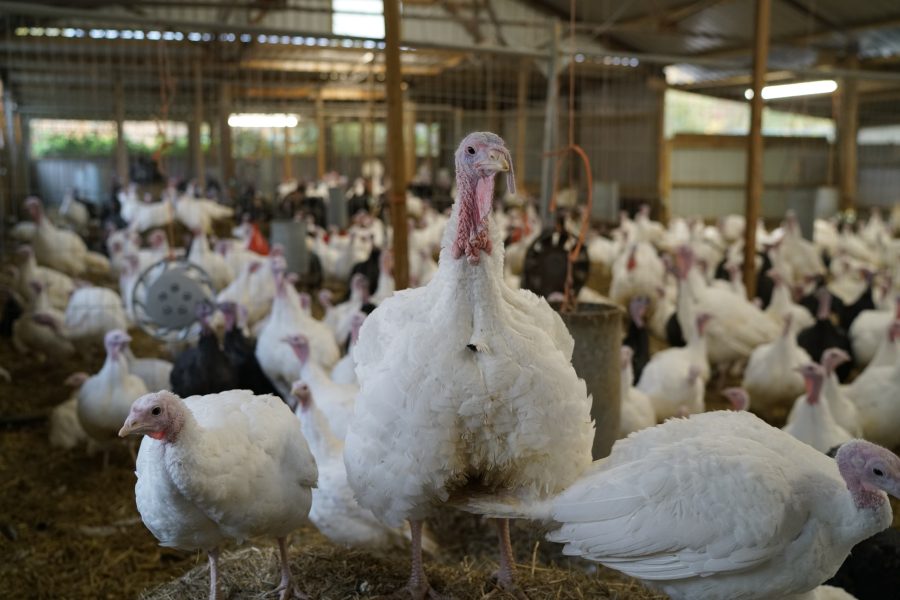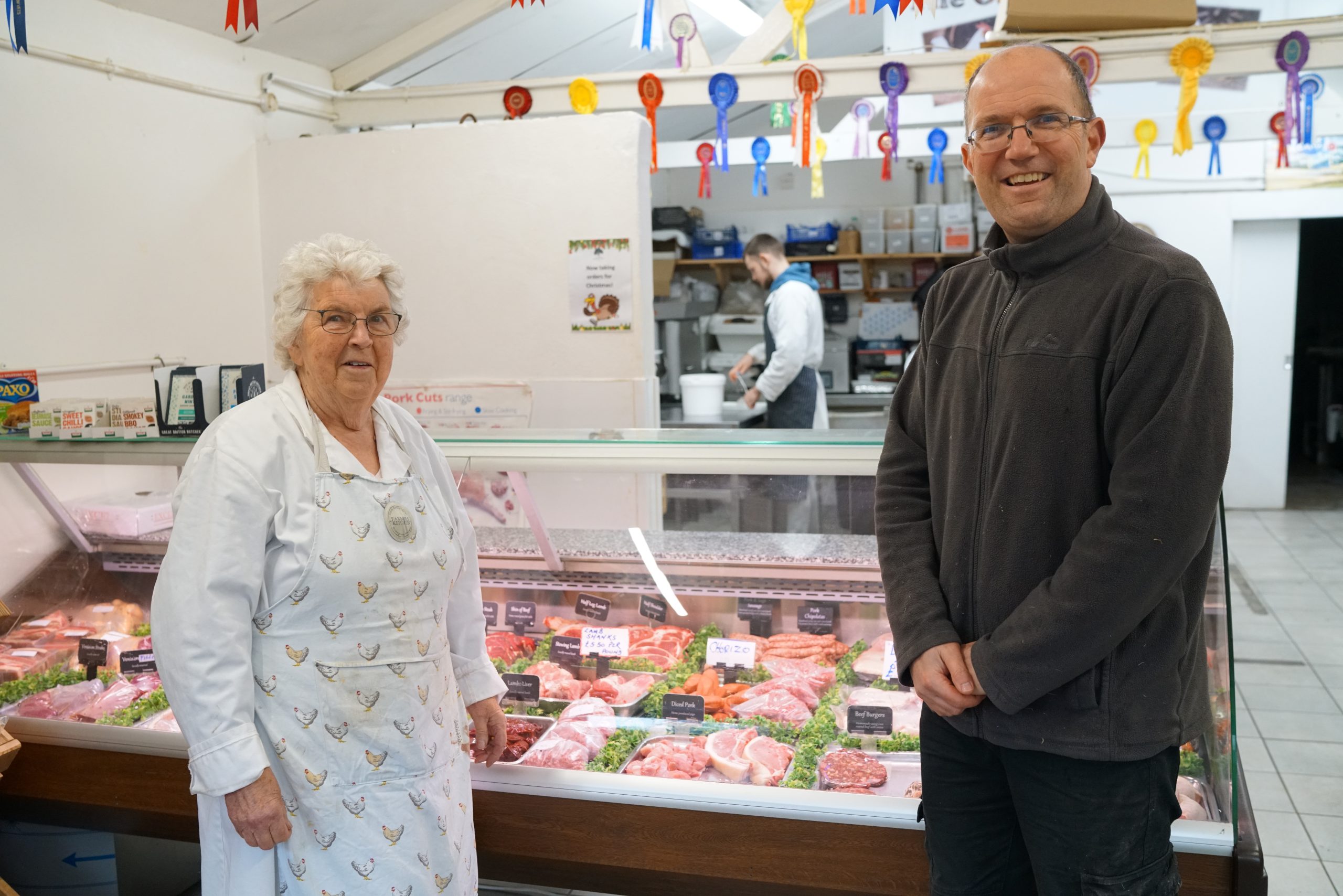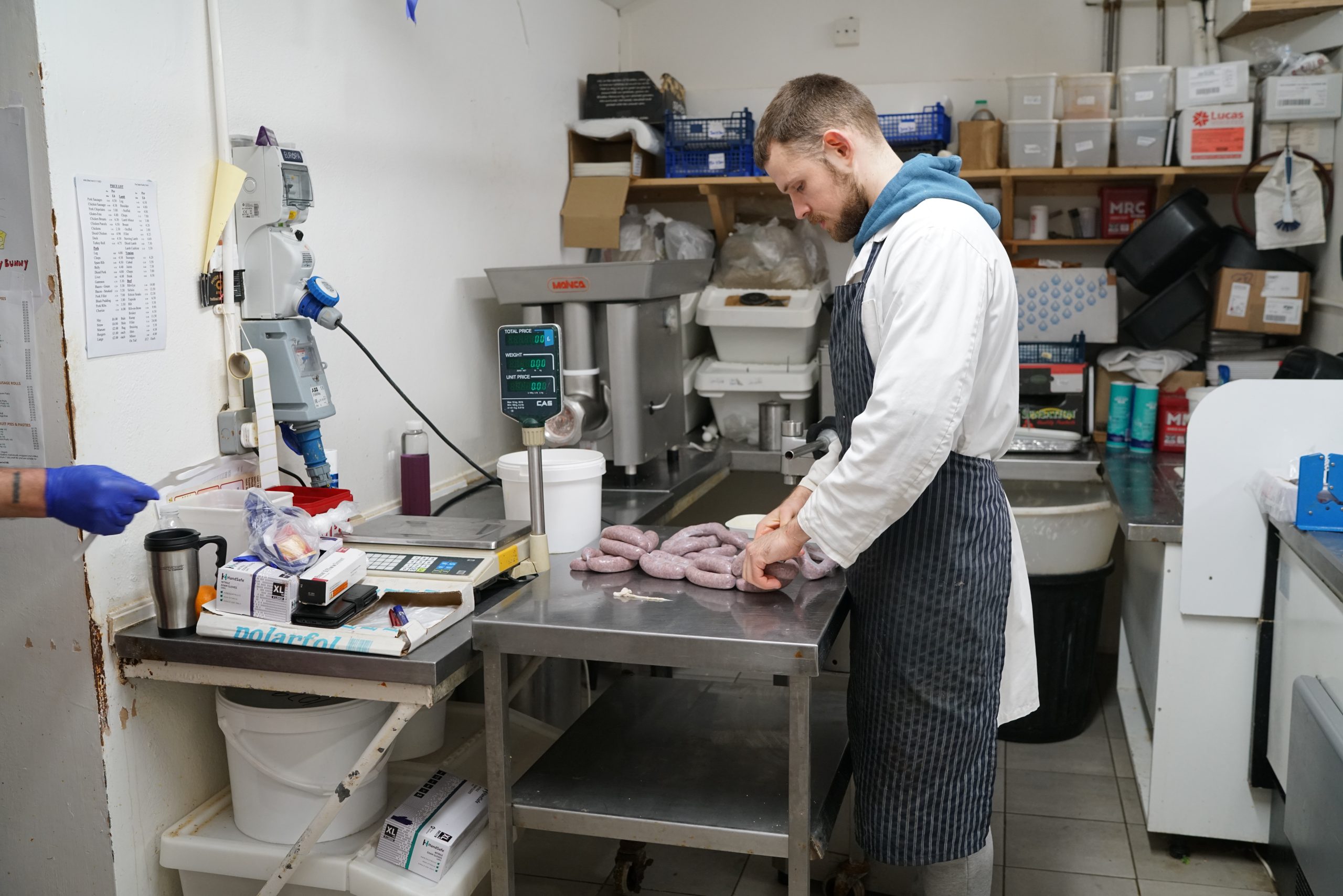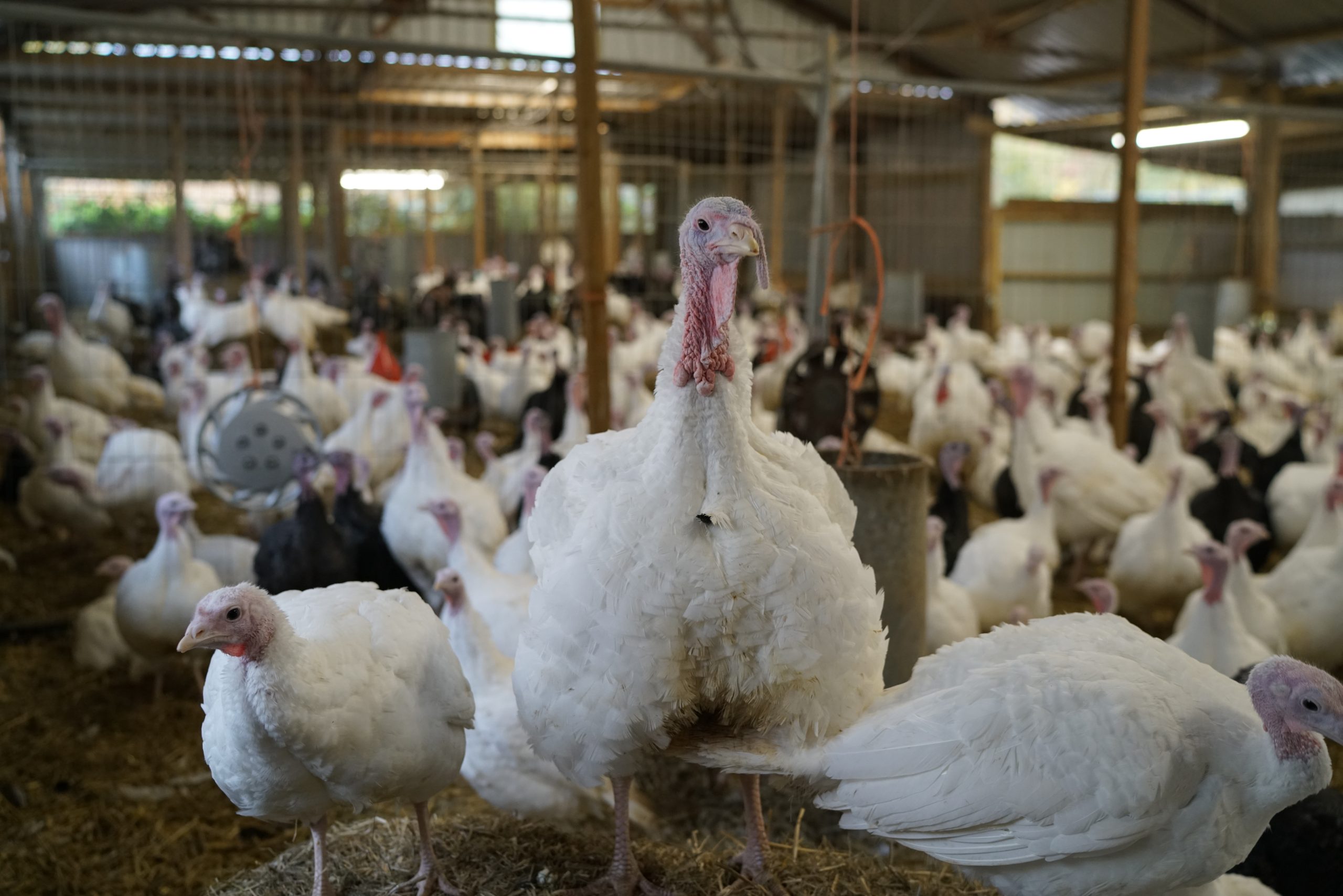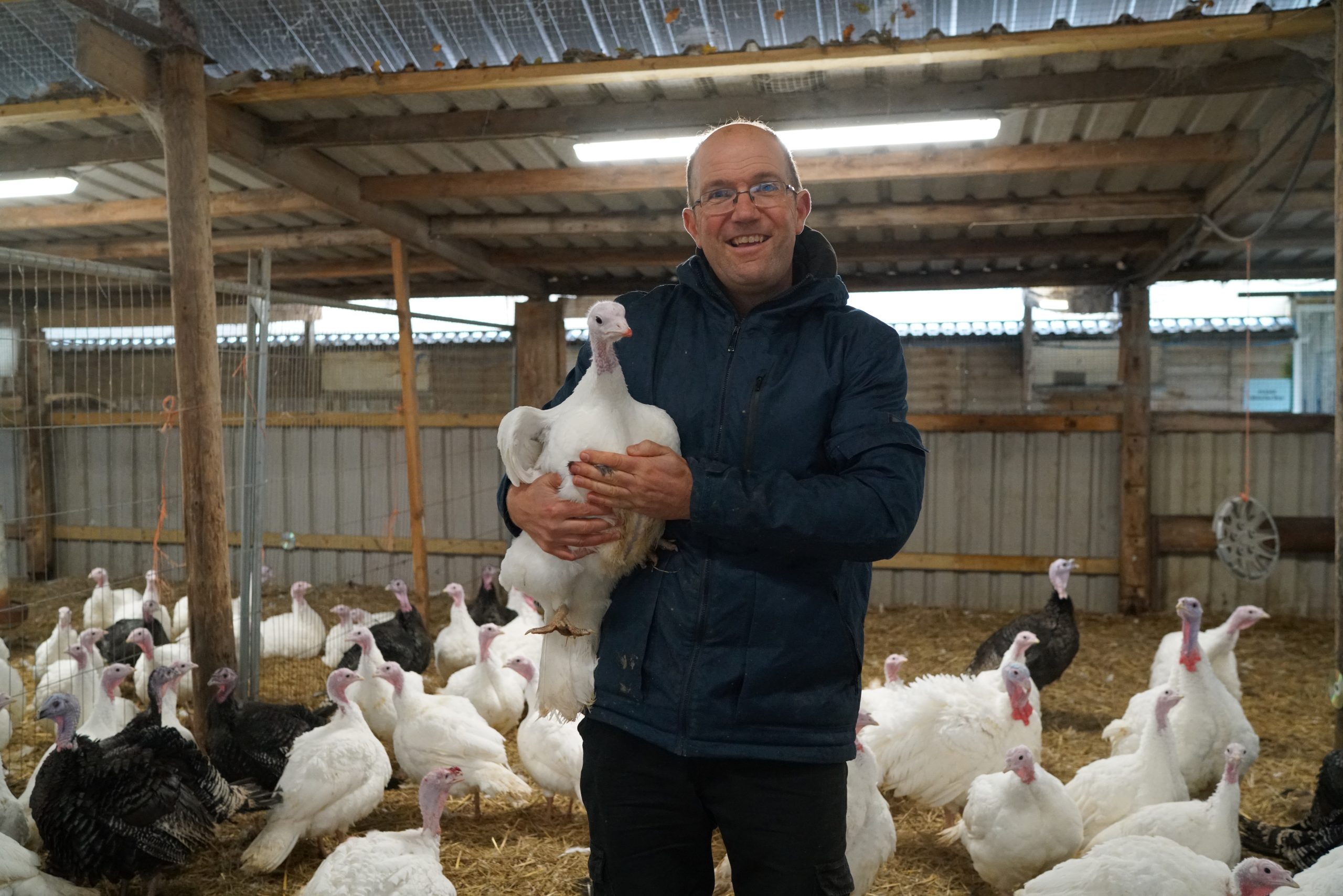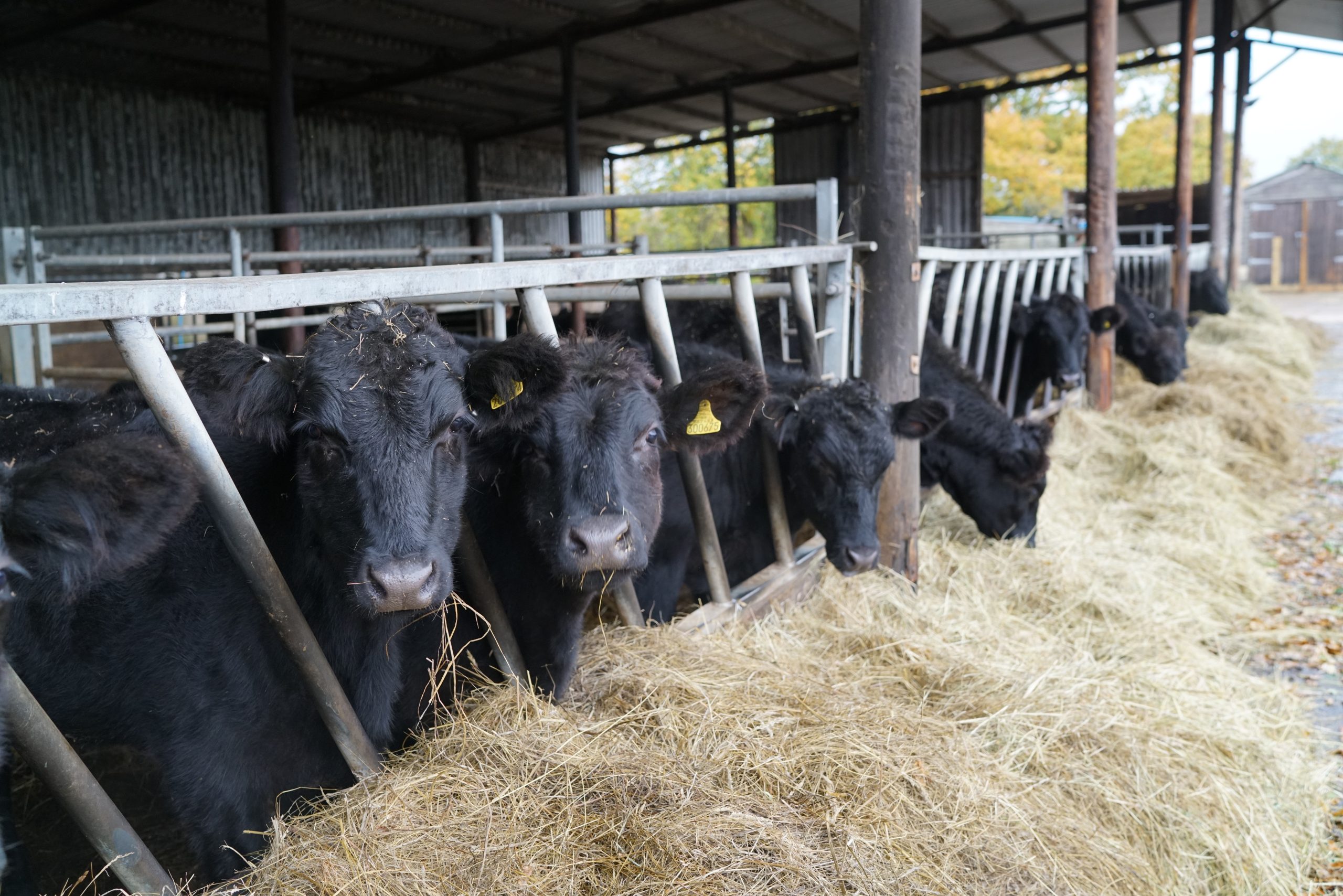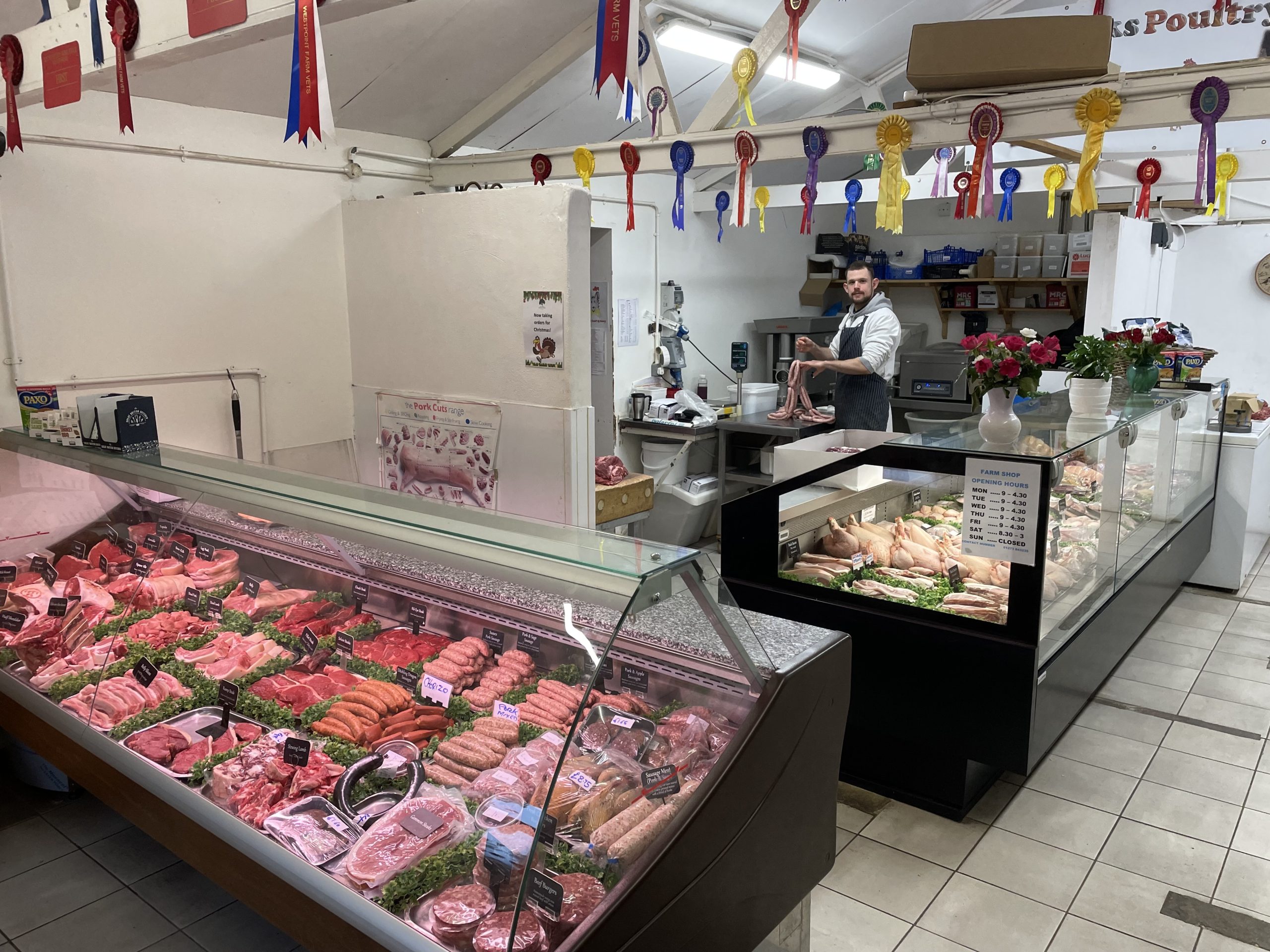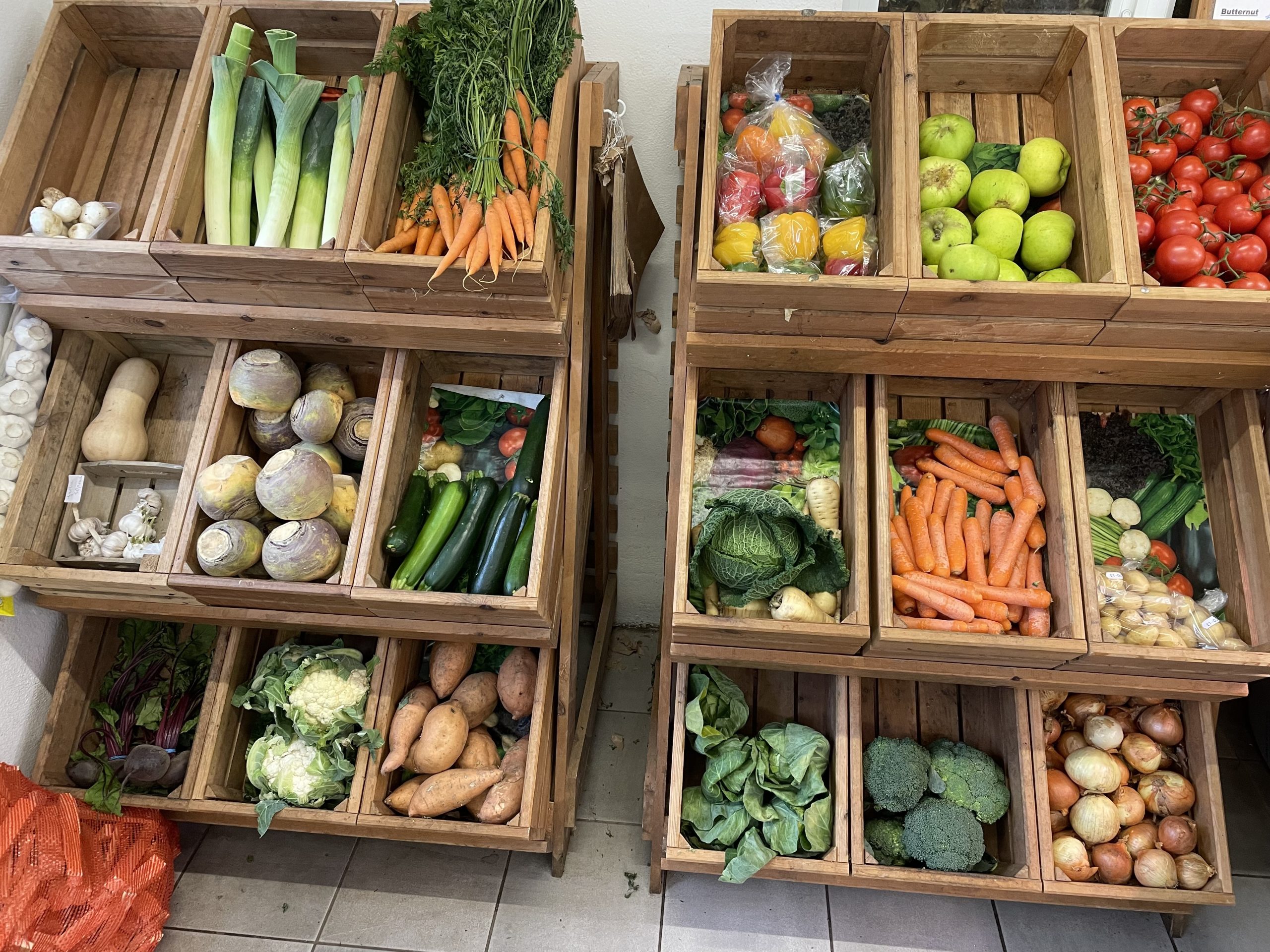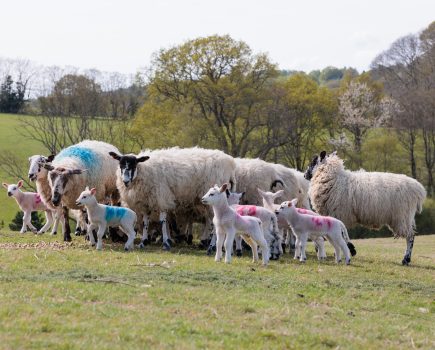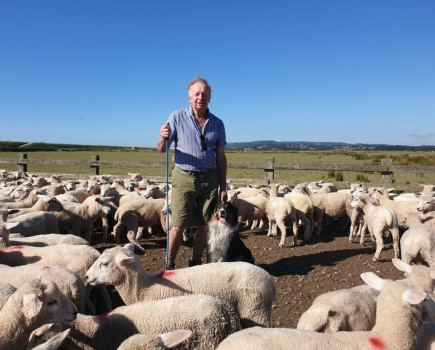This month Nigel Akehurst visits The Oaks Poultry Farm in Ditchling, East Sussex, located at the foot of the South Downs, to meet former Sky TV Accountant turned farmer Edward Perrett and his mother Audrey and learn more about their highly diversified family farming business.
Approaching the entrance to The Oaks Poultry Farm on Common Lane, I spot a large sign advertising the farm shop and café, with an enormous bronze turkey made out of what looks like a painted plywood board fixed to a black silage bale.
It’s chucking it down with rain, so I park up in front of the farmhouse and make a quick dash to the farm shop.
Inside, I meet Edward and his 84 year-old mum Audrey, along with their two butchers, Jim Awcock and Ian Lester, an apprentice from nearby Plumpton College.
In the shop window was a photo of Mark Perrett, Edward’s dad and Audrey’s husband, who sadly passed away of a heart attack in 2019.
Edward explained that his parents started the farm in 1969, when it was an empty field, and spent a lifetime building it into what it is today.
After a quick tour of their well-stocked farm shop and butchery, he took me through the back of the shop into their large poultry processing rooms.
He explained that his dad built the facility from scratch and had started with chickens and turkeys – hence the name – before quickly expanding into pigs and cows.
The poultry enterprise operates under the small-scale supplier class, slaughtering fewer than 10,000 birds per year, he said, meaning they don’t need a vet on site. The vast majority of their poultry is sold direct from the farm shop or to local butchers, he added.
Walking through the processing rooms, Edward pointed out the wet and dry plucking equipment, adding that they recently dry plucked 10 early turkeys for Thanksgiving.
In total they rear around 600 turkeys, a mixture of white and bronze, for Christmas, all sourced from Kelly’s hatchery. In addition, they rear 80 geese, 200 chickens and 20 ducks. The majority of these are pre-ordered in the shop or via the online shop (www.theoaksfarm.co.uk) for collection from the farm.
Imposter syndrome
Edward and his two younger brothers grew up on the farm but none of them showed any interest in farming.
“We’re two accountants and a chartered surveyor,” he said.
Edward spent most of his life at Sky Television as an accountant for the History channel but about 10 years ago decided to move down from London to be closer to the farm. He and his wife Katy, along with their three children (now 12, 15 and 18) moved down to Sussex.
“I never thought I would do it but didn’t want to have that armchair regret when I’m retired,” he added.
Initially his dad wasn’t ready for him on the farm, so he found a job in Brighton working for a software company. Then a few years later he attended a Christian festival and felt guided back to the farm by his faith when he was presented with a picture of his family in a flourishing field.
A short while later his boss told him he was being made redundant. His severance package, along with some shares, enabled him to work alongside his dad for free in 2018.
Sadly, he only had 10 months working alongside his dad before he died. It was big shock for the whole family and a steep learning curve for Edward on the road to becoming a farmer.
Referring to Clarkson’s Farm, he said: “I’ve got no idea, like Jeremy,” and added that he has his own Kaleb, a part-time farm worker who also worked for his dad.
“He’s built everything,” said Edward, pointing to the large, corrugated roof of the turkey barn, which he re-roofed recently in less than a week.
“My dad and his dad built this farm,” explained Edward.
He added the local farming community had been very supportive and that he often calls his mentor Richard Keen of Etherley Farm (who I featured in South East Farmer back in September 2021), a close friend of his dad’s, when he needs advice.
Diversified enterprises
His dad ran three ventures; a farm shop, business lets and caravan storage.
Since returning to the farm Edward has added a café, converted from an old staff room, run by his wife Katy, who makes all the delicious cakes, a children’s farm, summer campsite and a secure dog-walking field. He also has planning permission for a fishing lake but has put the project on hold for the time being.
“The vision for the farm is to create an environment for the local community to enjoy themselves in, and a place where families can spend time together,” he said.
The café, specialising in home-made cakes and locally sourced coffee, opened on 1 June 2019.
“Our customers enjoy the produce in a friendly atmosphere, with both inside and outdoor seating areas,” he said.
The children’s farm, opened last year, is aimed at anyone who loves looking at farm animals, he added. They have an indoor area with a large sand pit, a seating area, small animals including guinea pigs, rabbits and harvest mice, and a hatchery for chicks and ducklings.
An outside walkway provides access to see their pigs, ducks, geese, goats, donkeys and array of poultry.
Once the turkeys go in December, the large barn is cleaned out and turned into a giant playroom with hay bales and toy tractors.
He charges £5 per child, with parents going free. It’s been an effective pricing strategy, helping encourage a younger audience to the farm.
“The different ventures self-pollinate – during half term week when we had lots of visitors to the children’s farm, sales in the café and shop went up,” he said. While the farm shop accounts for most of the farm income, all the other ventures add value and bring in people.
In the café I meet Edward’s wife Katy, who is busy making crafts for their Christmas market on 9 December, another way of encouraging more people to the farm.
“For me it’s all about Christmas, as it funds what we do next year,” said Edward.
It’s very much a family business, with Audrey still working six days a week running the farm shop and making hot lunches for all the staff.
“At Christmas, when we have all the pluckers in, everyone gets a hot lunch to help motivate the staff,” he added.
23 December and Christmas Eve are their busiest days, when customers come to collect their turkeys and there can be queuing out onto the road, he said.
It’s all hands on deck, with Edward’s brothers Neil and James, sisters-in-laws Claire and Kate, nephew Noah, nieces Lois and Ellie and three children Emma, Alice and Ben all returning to the farm to help serve. His daughters and niece are barista trained and enjoy working in the café, he said.
Their other main event is the annual farm open day in the summer. A neighbour lends them a field for extra parking, and they welcome between 800 and 1,000 visitors through the farm gates he said, showing me some pictures on his phone.
Farm tour
With the rain easing, we head outdoors and grab a few photos of Edward in the turkey barn.
Previously they always reared white turkeys, but Kelly’s persuaded them to try some bronze turkeys, which are a local breed but can look a bit more stubbly on the table, he said.
Walking further down the yard, we pass their chicken sheds and cattle shed, where Edward keeps around 30 Angus cross cattle. He buys them as young stock from a local farmer in Plumpton and fattens them over 12 to 18 months before taking them to his local abattoir, Downland Traditional Meats. He collects the carcasses to be butchered on site and sold through the farm shop.
Opposite the cattle yards is their machinery shed and a cluster of other buildings used for commercial lets. In all there are 15 different businesses operating from the farm – from a roofing company to car mechanics. It’s a real community, said Edward. Behind the commercial lets is a caravan storage area and opposite that a two-acre camping field with toilet and shower block.
Edward started the summer campsite in 2019. They operate under 28-day permitted development rights and he charges £35 per pitch, which includes six free passes for the children’s farm.
The venture has been a great success and he said campers love the views of the South Downs from the top of the field.
Edward goes around selling wood to all the campers and enjoys the smell of all the barbecues and campfires.
Beyond the camping field and caravans, the rest of the farm is down to permanent pasture on which the cows graze during the summer.
The farm has two boars and 12 Saddleback sows which are used for breeding in their farrowing house, before the pigs are weened into a fattening shed. The family processes two pigs a week for the farm shop. There are about 60 pigs on the farm at any one point.
Filming location and front page news
Edward loves the variety of farming and is open to all sorts of things. Last year an episode of the ITV series Grace was filmed on the farm over two days. There were more than 50 vehicles and a crew of 60 people on the farm.
The film crew required a pig sty for the story of a farm worker finding a human bone in the pigs. It was a fun but hectic two days on the farm, with both Edward and his budding actress daughter Alice having walk on-parts in the episode.
Edward said his biggest worry was bird flu, which was rife at the time. Edward went around spraying every vehicle as it entered the farm, and luckily they didn’t experience any issues.
The following week, Edward also made the front page of the Daily Express when he agreed to be interviewed by a local journalist. They got talking about food prices going up and the next thing he knew he was front page news, with a double page spread on page three and four. He had expected a small article on page 30.
Work life balance and the future
I asked if he missed London life. “London is great. I loved living there in my twenties and thirties and Dad didn’t need me here and it all worked well.”
He said the biggest problem is children and family time, as they don’t have the weekends anymore.
“It’s a way of life but then I can finish at 4pm and take my son to football, so it’s swings and roundabouts,” he commented.
I ask him what he think about the Government’s farming and food policy. He replied that he didn’t know enough about it.
On direct government support he said his BPS is nothing compared to the big guys, but admitted he was probably missing out on some grant funding, preferring to prioritise family time in the evenings over filling in long-winded application forms.
His main concern is the lack of local slaughterhouses, with only one remaining in Sussex – an issue he highlighted to his local MP Maria Caulfield when she officially opened the children’s farm.
To improve the farm business Edward tries to use some of his skills from his old corporate life.
He has a mood board listing his core values, vision, purpose and objectives for the farm. These values include staff, integrity, quality and value. He also has a list of ventures he wanted to do, most of which he has now achieved.
The next five years is about maintaining everything and developing a younger team, he said. He says he’s not pushing his own children to go into farming and said his dad never forced him.
“They all love working at Christmas, they all need some money,” he said, adding that the oldest one is about to go to university.
“Will they take over? I don’t know and I am not worried about that. My brother James is very invested as well and comes with his two children, Noah and Lois, on a Sunday morning to do all the animals; that’s my one morning off,” he said.
At 50, he says he still feels young and needs to keep going for at least another 10 years to get his children through university.
“I’ve invested heavily now as we live on site and we need to keep going to pay for day-to-day living. There’s no succession plan. Dad didn’t have a succession plan and I haven’t got one yet. My plan is to get my children through uni and then I can start to think about that,” he said.
Away from the farm, Edward is a big sports and football fan, with a season ticket for Brighton & Hove Albion. He also runs his son’s football team and is a huge advocate for sport, commenting that he learned a lot of life skills playing team sports.
- Audrey and Edward Perrett
- Plumpton College apprentice butcher Ian Lester
Farm facts
- 50-acre holding
- 600 barn-reared turkeys from Kelly’s hatchery and 80 geese, 200 chicken, 20 ducks for Christmas
- Produce barn reared chickens all year round, processing them on-site under small-scale supplier class (under 10,000 birds per year)
- All turkeys are dry plucked and all chickens wet plucked
- All local staff including three Plumpton College students
- Farm shop and butchery (sell half a bullock, two pigs and three lambs per week, plus 150 chickens) accounting for around 80% of farm income
- Rear 25 to 30 cattle, which they buy in from a farmer in Plumpton as young stock and fatten for the butchery
- Have two boars and 12 sows with around 60 pigs at any one time
- Have all their own hay-making kit and buy standing grass to produce 3,500 bales of hay and 2,000 bales of straw every year
- Commercial lets
- Caravan storage
- Café
- Children’s farm
- Summer campsite on two-acre field
- Secure dog-walking field
- Planning approval for a fishing lake which would be their eighth venture
- One farm hand, a shop hand, two butchers
- Temporary staff come in to process poultry

